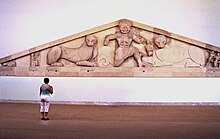Κόρκυρα | |
 Gorgon at the Archaeological Museum in Corfu | |
| Location | Corfu, Greece |
|---|---|
| Coordinates | 39°36′26″N 19°55′06″E / 39.60722°N 19.91833°E |
| Type | Settlement |
| History | |
| Cultures | Ancient Greece |
Korkyra (also Corcyra /kɔːrˈsaɪ.rə/;[1] ‹See Tfd›Greek: Κόρκυρα) was an ancient Greek city on the island of Corfu in the Ionian Sea that is adjacent to Epirus.[2] It was a colony of Corinth that was founded in the Archaic period. Korkyra was acting as a port of call on the sailing routes, especially to reach the Italian coast or to venture farther north. According to Thucydides, the earliest recorded naval battle took place between Korkyra and Corinth, roughly 260 years before he was writing,[3] and thus in the mid-7th century BC. He also writes that Korkyra was one of the three great naval powers in 5th-century BC Greece, along with Athens and Corinth.[4]
The antagonism between Korkyra and its mother city, Corinth, appears to have been an old one. Quite apart from the naval battle that Thucydides mentions, Herodotus records a myth involving the tyrant of Corinth, Periander. Periander was estranged from his younger son, Lycophron, who believed that his father had killed his mother, Milissa. After failing to reconcile with Lycophron, he sent him to Korkyra, which was within Corinth's governance. In his old age, Periander sent for his son to come and rule over Corinth and suggested that they would trade places and he would rule Korkyra while his son came to rule Corinth. To prevent that, the Korkyraeans killed Lycophron. In punishment, Periander captured 300 young men of Korkyra with the intention of castrating them.[5] That is more likely to be a myth explaining the animosity between Corinth and Korkyra and justifying the use of the word tyrant for Periander's rule than an actual historical event.[6]

- ^ "Corfu". Merriam-Webster.com Dictionary. Retrieved 18 October 2024.
- ^ An Inventory of Archaic and Classical Poleis: An Investigation Conducted by The Copenhagen Polis Centre for the Danish National Research Foundation by Mogens Herman Hansen, 2005, page 361
- ^ Thucydides, History of the Peloponnesian War 1.13.
- ^ Thucydides, History of the Peloponnesian War 1.36.3
- ^ Herodotus, The Histories 3.48-52.
- ^ Osborne, R. 1996. Greece in the Making 1200-479BC. Routledge.
